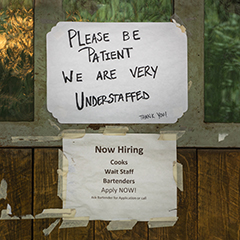Hiring Workers This Summer and Beyond
June 7, 2022 | Business Plans, Financial Planning
 In today’s tight labor market, small businesses — including restaurants, delivery services, retail stores, and manufacturers — struggle to hire and retain top-quality staff. The conditions are likely to worsen in many sectors as demand ramps up during the summer months. To be competitive with other employers, you’ll need to be proactive in identifying candidates with the right fit at a reasonable cost. Here are seven tips on hiring the help you need before the summer rush begins.
In today’s tight labor market, small businesses — including restaurants, delivery services, retail stores, and manufacturers — struggle to hire and retain top-quality staff. The conditions are likely to worsen in many sectors as demand ramps up during the summer months. To be competitive with other employers, you’ll need to be proactive in identifying candidates with the right fit at a reasonable cost. Here are seven tips on hiring the help you need before the summer rush begins.
- Seek referrals from within your organization. Without realizing it, you may already have a valuable resource for new hires right under your nose. Ask your current employees for references and recommendations. You might even offer bonuses for doing so. Of course, this strategy could backfire if your employees recommend friends or family members with checkered work histories. So, make sure that all candidates are properly vetted before they’re hired.
- Provide training to your existing workers. You may be able to upskill some of your current employees by investing in their education. Companies can generally deduct the cost of courses or seminars that employees attend to maintain professional or job-related skills for federal tax purposes. The write-off isn’t limited to tuition. It also covers books, supplies, and certain travel costs. (There are some limits for company owners on deducting the cost of education that’s not related to the job, however.)
In addition, some employers provide tuition reimbursement programs for work-related education expenses. Typically, these reimbursements are a tax-free fringe benefit to employees (no income or employment taxes on the value), and the employer can deduct the costs as business expenses. Alternatively, if a company maintains a written educational assistance plan, an employee may be able to receive up to $5,250 in annual tax-free education benefits. For this purpose, the courses don’t have to improve or maintain job‑related skills. They can lead to a new job, help the worker meet minimum requirements, or be educational.
- If you decide to look for external job candidates, you don’t have to do it alone. Partner with local schools. Consider partnering with educational institutions, such as public high schools, vocational and trade schools, community colleges, and four-year colleges and universities. They can provide a large labor pool to draw from, allowing your company to advertise part- and full-time job openings and other learning opportunities, such as internship, co-op, and apprenticeship programs.
- Participate in economic development programs. Some communities and local not-for-profit organizations offer programs to foster economic and career development by linking the needs of local workers and local employers. Typically, community-based providers work with nearby businesses to give training to individuals enrolled in the program. This enables workers to match up with your company’s needs.
- Join industry groups. It can’t hurt to meet with other employers who are in the same boat as you are. You can share ideas and methods for finding workers who have proven successful. In addition, your job postings may be extended to a broader audience through these types of networks.
- Expand your reach with technology. If you want to get the word out that you’re hiring, you must be visible on the websites that job applicants are likely to visit. It’s also important to facilitate applications online and through social media. For example, you might target social media platforms like Instagram and Snapchat to attract young part-timers. But LinkedIn might be more appropriate for higher-level, full-time positions. Also, consider posting open positions on college job recruitment sites, such as AfterCollege, CollegeGrad, and Handshake.
- Create internship programs. Internships and co-ops provide a creative way to bring talent into the fold. They give students and new graduates opportunities to gain work experience in a professional setting. Although interns typically receive no guarantees of future employment, participation in these programs could lead to a job or some other connection down the road. Generally, a mentor will be designated to supervise interns for a set time (for instance, 12 weeks in the summer).
Important: Internship and co-op programs may raise questions relating to compensation. Interns may not receive the same pay level as other part-time workers — or they may not even be paid at all.
Ready, Set, Hire
Expect that finding summer help for your business will be difficult this year, so you may have to think outside the box. Your professional business advisors can provide guidance. You can take a more aggressive approach than usual as long as you continue to comply with all the governmental requirements.
